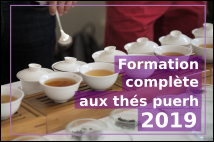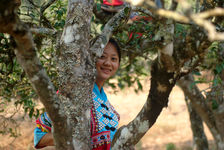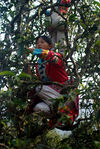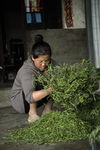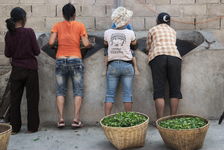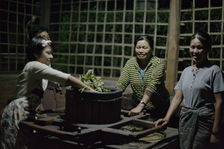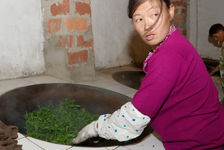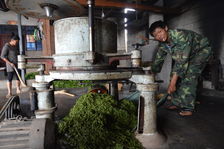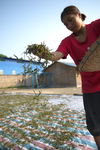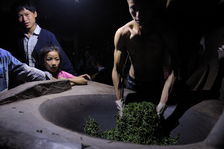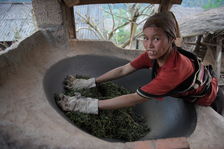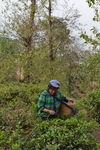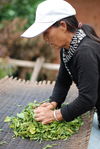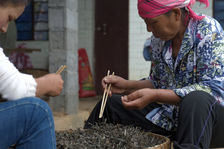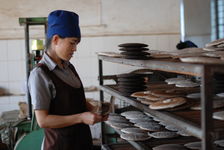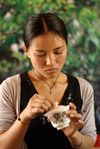 This page is not a real translation but just an automatic translation generated by computer of the original article, written in French language! Its not good... but better than nothing!
This page is not a real translation but just an automatic translation generated by computer of the original article, written in French language! Its not good... but better than nothing!Want to help us do diffuse puerh tea culture in english, by providing a better (or corrected) translation?
Please contact us!

There are more and more questions about the conditions of those who produce the teas we taste. Are these conditions "fair", are workers, producers, sellers treated and paid properly? Who benefits from the sale of tea?
Today I would like to speak quickly to a slightly different question, of which there is little talk and which puerh (Pu Er tea) tea lovers are probably not aware in the West:The place of women in the world of tea in Yunnan and more generally in the triangle Of gold, where puerh (Pu Er tea) teas are produced.
For many women's image in tea, it is these charming picking that we see on the photos singing while working, young and pretty and in beautiful traditional costumes. Very often, they are actually pretty girls from the town who were disguised and placed in front of a tea tree for the photo, more than real peasants. Some mediated villages have even pushed the matter further by organizing genuine choreographies, with press, television and company, and depict a fairyland landscape at a hundred places of what is actually seen in the tea gardens of Yunnan.
Because the true picker in Yunnan is less saleswoman. Very often it is a badly dressed granny, with old clothes dirty and patched, when it is not actually ... a man!
If indeed there are few more women in the tea gardens, the gathering of leaves is by no means a job reserved for them and there are also many men who gather tea, Either in Yunnan, Thailand, Laos or Burma.


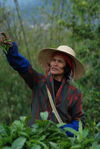
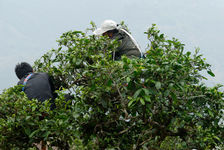
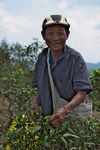
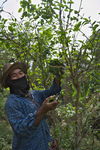
- 1.Women gathering leaves at Bing Dao
- 2.Women plucking leaves at Fengqing
- 3.Women plucking tea leaves
- 4.Man and woman in a tea tree
- 5.Man Picking leaves in Laos
- 6.Man plucking leaves in Thailand
Then why this eternal image of the beautiful and young tea-gatherer who climbs in the trees? And because for the image one can not do better! Already and it is well known a young woman, especially if one make up makeup and one adds a small colored costume, it is much more salesman than a man or an old woman. But in addition it allows to place in the same plane a pretty girl and a tea tree. In short it is the sexy girl who poses next to the car in the pub, it makes the consumer dream and it works thunder!
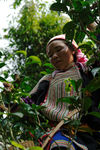
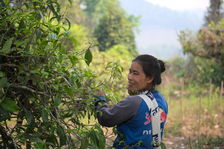
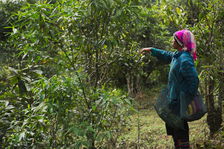

- 1.Young woman in a tree in Nanmei
- 2.Young woman plucking leaves in Thailand
- 3.Young woman gathering leaves in Pasha
- 4.Promotion for a puerh (Pu Er tea) tea in Taiwan
Now it 's very nice the tea - gatherers, pay their homage to the passage and thank them for their hard work, but it must nevertheless be remembered that in the production of tea, gathering is one of the jobs that demands the least Experience, which is the month valued and which is by far the least paid. For example, if it is for example systematically the women who gather tea in India (and often also in Nepal although it is less strict), this does not give them, and far from it, a very enviable place in the world Indian tea, nor great profits on the sale of these teas.
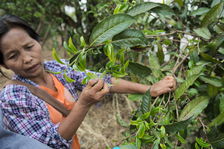
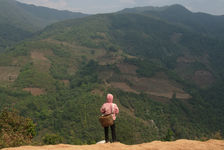
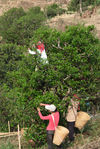
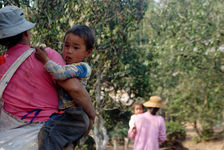
- 1.Tea Collector in Thailand
- 2.Tea Collector in Mengku
- 3.Tea Collector in Bing Dao
- 4.Tea Collector in Pu'Er
Yunnan, and more generally in the golden triangle, is where the place of the woman is not in the garden, and her role is very far from being limited To the picking of leaves! Leaf transformation in particular, which requires a lot of know-how, and which is worth remembering is the crucial step that will make a big tea from simple leaves of trees, is commonly done by women These steps are almost exclusively under the responsibility of men in Japan or India).
In other words, if great puerh (Pu Er tea) are great puerh, it is often thanks to the experience and mastery of the women who are behind. But as is the case of the gathering it will be noted that this work is not nevertheless gendered and that one finds as well men as women behind the transformation of the tea puerh.
When the production is family-oriented, the male and female members of the family generally work together on the leaves, one of them, for example, drying, the other rolling. This is the case, for example, of the family of Wang Bing, a small producer of Yi Wu, to whom I have devoted A complete article , where all the stages of tea production, from picking to squeezing and packing of cakes are carried out by the different members of the family.
A day with the family of Wang Bing
In the spring, the day begins at dawn in the family of Wang Bing. Sometimes when the leaves of yesterday's leaves to transform - which is ideal for the quality of tea but not always possible in high season - the grandparents will start their day by working these leaves. When the grandfather of the family takes charge of drying the wok, his wife takes care of the manual rolling of the leaves, but it is common that the roles are reversed according to the mood of the moment.
Once the leaves are processed and dried, they will go together to the family garden, which is a half hour's walk from the village. They will spend the day picking the leaves together, interspersed with a short break to picnic before joining the rest of the family.

Meanwhile, Wang Bing and his wife walk through the neighboring villages to sprout leaves of old trees. Yi Wu is a highly recognized and particularly speculative land, and the lack of honesty of many peasants is no longer to be proved. It is a particularly difficult and stressful job, which requires a great deal of attention and skill. To evaluate the authenticity and quality of the leaves (which can not usually be tasted before purchase), or to judge the reactions and the statements of the peasants.

For this, Wang Bing and his wife are doing a formidable and thoroughly honed teamwork. While one jokes with the family that sells the leaves, the other for example discreetly discovers a leaf, or glances at those that are drying at the bottom of the garden. The time spent in a family can be very fast or longer depending on the day, the situation, the speculative atmosphere of the moment, the relationship they have with the family ... Never a word is exchanged between Wang Bing and his family The quality of the tea, what they think of the price, the origin of the leaves, but a few glances and discreet expression of the faces are enough for each of them to know thoroughly what the And whether or not they will leave with a bag of leaves in their hands ...

When it comes to squeezing puerh (Pu Er tea) cakes, in the small workshop of the family home, the couple is usually helped by the brother-in-law of Wang Bing. It is a team work where everyone has his place:Mrs. Wang takes care of the weighing and the steaming of the leaves, which will be coated shaped into patties by her brother in law, before being finally pressed by Wang Bing To the aid of heavy stones.

It is after dinner, at nightfall that the transformation of the leaves picked in the day will begin. Depending on the amount of leaves the grandparents, or Mrs. Wang will take care of. In the spring, when the quantities are bigger, all the family participates in this transformation together, until late in the night ...
A similar situation is encountered on a larger scale in co-operatives or larger workshops that involve labor, and where the work of the leaves is done by men as well as by women. In many workshops I visited, whether in Yunnan but also in Burma, Thailand or Laos, men and women work side by side whatever the position they occupy. Moreover, many of these workshops, under the responsibility of the whole production chain, from the purchase of fresh leaves to the peasants and the marketing of maocha (processed but uncompressed puerh), are run by women .
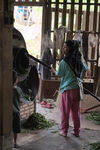
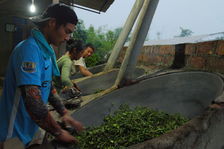
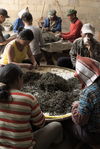
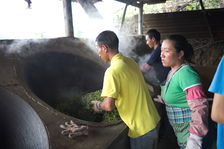
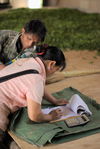
- 1.Leaf processing workshop in Thailand
- 2.Men and women working together tea leaves
- 3.Sorting leaves in a Jinuo Shan workshop
- 4.Workshop in Pasha
- 5.Cooperative run by a woman in Jinuo Shan
This is the case, for example, of A Se, a dynamic young producer who has set up and runs a small leaf processing workshop in Phongsaly, Laos.
A Se, a young Chinese producer in Phongsaly
A Se is Hani (one of the ethnic groups present in Yunnan), and comes from the Menghai region of China. Coming from a modest family of peasants but with a handful of tea trees, she spent her childhood in the countryside of Menghai, where she discovered tea. Teenager she will leave to work in a factory of tea of the region. Factory work is difficult but very formative. She will learn the transformation of the leaves, but also the rigor required by tea production and factory work.
A decade ago, a Malaysian businessman, a country where puerh (Pu Er tea) tea is appreciated for a long time, discovers the unknown richness of Phongsaly's land, and decides to produce tea there. Although the trees and the soil of the region are exceptional, the work of the leaves by the farmers is generally not rigorous enough to produce quality teas, and he then decides to create a factory to transform the leaves and produce a tea To the height of its expectations. What he needs for this is a person responsible for the processing of leaves to train Laotian staff and supervise production. It is in Menghai, region recognized for the quality of his work, that he meets A Se, who ends up being convinced to settle in Phongsaly and become responsible for the production of this factory.

After a few years in this factory, A Se will start her own business and will go up with her husband to her own small puerh (Pu Er tea) tea factory. They go around the different villages of Phongsaly to buy the fresh leaves, which they transform daily in the evening. When quantities are large and they can manage as many sheets as they engage a few people, young dynamic Laos that A Se trained in tea processing, or elderly women from the village for leaf sorting.
This broad female presence is not limited to the production of Mao Cha. It is also found in larger producers who own their brand and who develop, market and market tea cakes. Thus in many factories the workers are both men and women. Some spots, such as leaf sorting, are more often done by women, which are usually recognized as more skillful and accurate (this pattern is also found in Nepal), while others are very physical such as hand compression Patties using heavy stones (several tens of kilogram) are more often performed by men although I have often seen women ensure the pressing of the patties!
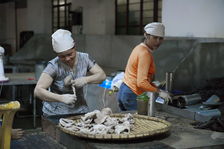
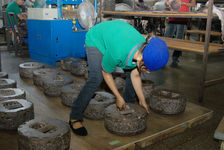
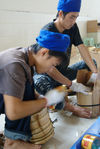
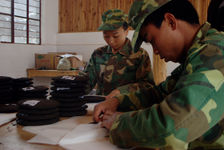
- 1.Women packing puerh (Pu Er tea) flip-flops at Chen Sheng Hao
- 2.Women compressing puerh (Pu Er tea) patties at Chen Sheng Hao
- 4.Men and women racing at a factory in Jinuo Shan
Again this feminine presence is not limited to workers, and many of the most famous factories or tea brands in Yunnan have been founded or are run by women. For the most famous puerh (Pu Er tea) producers, we will mention in the first place Haiwan , founded in 1999 by Mr. Zou Bing Liang and Ms. Lu Guoling, former director of the famous Menghai Tea Factory. Another great puerh (Pu Er tea) industry, Six Famous Tea Mountains (Liu Da Cha Chang), founded by Mrs. Ruan Dian Rong, expert, author and great tea, also former director of Menghai Tea Factory. One could also mention Lancang Gu Cha, another name among the world's leading brands of puerh, founded and directed by Mrs. Du Chun Yi.
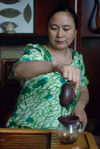
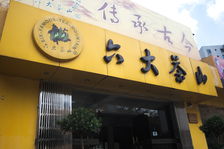
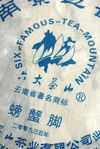

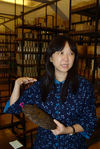
- 1.Six Famous Tea Mountains
- 3.Six Famous Tea Mountains one of the great puerh (Pu Er tea) industry founded by a woman
- 4.Haiwan large puerh (Pu Er tea) industry co-founded and co-led by a woman
- 5.Camellia Siow director of tea art at Purple Cane Malaysia
Of course, in addition to these tea mastodons, which each produce several thousand tons of puerh (Pu Er tea) a year, there are in Yunnan a very large number of small factories, which engage men as well as women, but above all that are also well managed By men than by women. I think for example Meng Yan Guo Yen Cha Chang, founded and headed by Mrs. Dong Guo Yen.
This crucial place of women is equally notable in the sale of tea, and many tea shops are run by women, whether in wholesale or retail. For example, in the wholesale markets in Kunming and elsewhere, the women you see infusing teas in order to make them taste clients are often not, as you might think at first glance, young girls trained to serve Tea as one sees in many Chinese tea houses, but the businesswomen who manage the tea trade, and are today at the heart of the puerh (Pu Er tea) market.
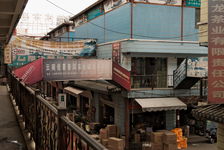
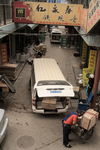

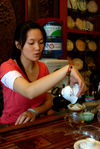
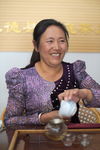
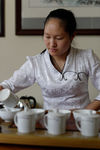
- 1.Kunming Tea Market
- 4.Kunming Tea Vendor
- 5.Tea Vendor and Producer (Zhaijichafang) In Kunming
- 6.Tea seller and producer (Kucong Shan Zhai) in Pu Er
Beyond the production and sale of tea, there is also a large female presence in the cultivation of tea. A large number of the most important and respected experts, researchers, authors, or "tea masters" are indeed women. Many books on puerh (Pu Er tea) tea have been written by these women, whether they concern agriculture and the production of tea, its history, its terroirs, the various cultures associated with tea, or the art of Gong fu cha and tea infusion. Among many others we can mention the anthropologist Jinghong Zhang, a native of Yunnan who recently wrote one of the rare books in English devoted to puerh (Pu Er tea) tea, or in the Chinese language, Ruan Dian Rong, who has written a few books on puerh, But especially Zhan Ying Pei who published several books in which the high quality of his research work on the soil of Yunnan is reflected.
This strong feminine presence in the intellectual circles of tea emerges from the golden triangle, where puerh (Pu Er tea) is produced, and is particularly marked in regions where the culture and art of tea are deeply developed, as in Taiwan where There is a wide female presence among artists, researchers, tea teachers (I think for example and among many others to Li Shu Yun, who has developed a whole research around the thought of the object and the " Aesthetics of the gong fu cha).
Although the world of tea is still largely male-dominated in a number of countries such as Japan, India, see Nepal, where women's presence is often restricted to tea gardens but rarely to higher positions , The world of tea in Yunnan and more generally in the golden triangle, appears to be an interesting example of equality between men and women.
From the gathering of leaves to the art of infusing them, through their transformation and their trade, none of the trades of the puerh (Pu Er tea) and its culture are in fact dominated by one sex or the other. Men and women work together, have the same conditions of work and remuneration, and live there serenely without feeling machismo.
Many women occupy key positions in the production of tea, are at the head of famous factories or big industries, are recognized for the quality of the teas they transform, that they design or commercialize, And have by their writing or teaching a strong influence on the cultivation of tea in China and beyond.
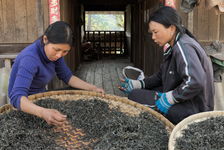
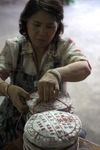
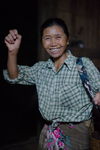
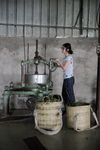

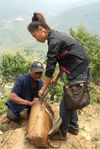
- 1.Small producers in Yanuo Shan
- 2.Producer of Puerh in Thailand
- 3.Tea producer in Burma
- 4.In a workshop in Burma
- 5.Tea expert in Malaysia
- 6.Mengku fresh leaf fountain
While the golden triangle is generally perceived as an underdeveloped area, and often considered late by the so-called developed countries, it presents an obvious advance on this question, and is a model that is hoped will depend on others Producing countries around the globe.

